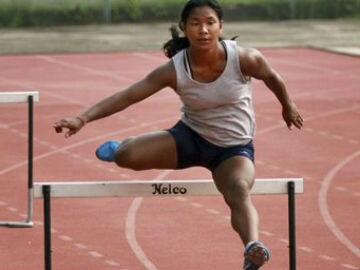
Indian athlete Swapna Barman, who has a foot deformity, works out during a practice session(AP)
New Delhi:
Merely wearing shoes is painful for Swapna Barman. She was born with six toes on each foot, and can't afford specialized footwear.
Yet, somehow she has overcame all that to be picked by India to compete in the grueling test of skill and endurance that is the heptathlon at the Asian Games in Incheon, South Korea.
And she and her coach believe she could even medal.
"Wearing the standard-sized shoes hurt, as it is, but I can't worry about all that right now," Barman says in a telephone interview. "My coach has set certain goals for me and that is what I'm focused on."
Having extra digits on a foot - a common congenital malformation called polydactyly - is considered lucky in some parts of India. The 18-year-old Barman is hoping for some luck.
Her coach Subhash Sarkar, originally rejected her as a high-jumper despite her success at a junior level. But he agreed to mentor her in the heptathlon.
"I felt she did not have the frame to be a good high-jumper, and also a tendency to gain weight. On the other hand, she has power that helps her in other events," Sarkar said. "She improved a lot but to hope to win an Asian Games medal you need to clear 1.90 meters or thereabouts, which I did not think she was capable of.
"In heptathlon, however, you can win a medal with an aggregate of 5,500 points, and that is what our aim is for the Asian Games."
Barman was picked after finishing second, by two points, with 5,400 at the India qualifying championships last month. Suddenly, her's and Sarkar's goal to make the 2018 Asian Games had to be revised.
No Asian woman has totaled more than 5,500 this year, so Barman has a chance at a medal if she can achieve another personal best.
"Her strong point is that she learns techniques easily," Sarkar says.
"That is something of a God-gift, and which has helped her improve so fast."
Barman, whose laborer elder brother supports her and their paralyzed father in Jalpaiguri in West Bengal state, has had some help from local manufacturers, who try to make shoes to meet her needs. The extra toes aren't really a factor that Sarkar is concerned with.
"That is something she will always be known, for I guess. The fact is that she goes through a lot of pain as her sixth toe folds up inside a shoe," her says. "But then I have not heard of any technology that can take care of that. It's a pain she will have to live with."
Yet, somehow she has overcame all that to be picked by India to compete in the grueling test of skill and endurance that is the heptathlon at the Asian Games in Incheon, South Korea.
And she and her coach believe she could even medal.
"Wearing the standard-sized shoes hurt, as it is, but I can't worry about all that right now," Barman says in a telephone interview. "My coach has set certain goals for me and that is what I'm focused on."
Having extra digits on a foot - a common congenital malformation called polydactyly - is considered lucky in some parts of India. The 18-year-old Barman is hoping for some luck.
Her coach Subhash Sarkar, originally rejected her as a high-jumper despite her success at a junior level. But he agreed to mentor her in the heptathlon.
"I felt she did not have the frame to be a good high-jumper, and also a tendency to gain weight. On the other hand, she has power that helps her in other events," Sarkar said. "She improved a lot but to hope to win an Asian Games medal you need to clear 1.90 meters or thereabouts, which I did not think she was capable of.
"In heptathlon, however, you can win a medal with an aggregate of 5,500 points, and that is what our aim is for the Asian Games."
Barman was picked after finishing second, by two points, with 5,400 at the India qualifying championships last month. Suddenly, her's and Sarkar's goal to make the 2018 Asian Games had to be revised.
No Asian woman has totaled more than 5,500 this year, so Barman has a chance at a medal if she can achieve another personal best.
"Her strong point is that she learns techniques easily," Sarkar says.
"That is something of a God-gift, and which has helped her improve so fast."
Barman, whose laborer elder brother supports her and their paralyzed father in Jalpaiguri in West Bengal state, has had some help from local manufacturers, who try to make shoes to meet her needs. The extra toes aren't really a factor that Sarkar is concerned with.
"That is something she will always be known, for I guess. The fact is that she goes through a lot of pain as her sixth toe folds up inside a shoe," her says. "But then I have not heard of any technology that can take care of that. It's a pain she will have to live with."
Track Latest News Live on NDTV.com and get news updates from India and around the world

